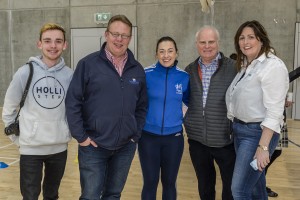An open day was recently held at the WIT Sports Arena to promote a new group for those with dyspraxia aged between five and 18. It’s hoped this pilot project can be replicated in other counties in the future.
DEVELOPMENTAL Coordination Disorder (DCD), also known as dyspraxia, is a common disorder affecting gross and fine motor movement in children and adults.
The condition is formally recognised by international organisations including the World Health Organisation (WHO).
Despite this, dyspraxia, which affects skills such as organisation, planning and sequencing and can impact on basic tasks in everyday life as well as speech, doesn’t have a high level of recognition amongst the general public.

Aaron and Paul Dower, Pauline Cunningham (Waterford Sports Partnership), Harry Conway (Dyspraxia Ireland) and Karen Power
Children with dyspraxia may present with difficulties around self-care, writing, typing, riding a bike and playing as well as other educational and recreational activities.
For some, such difficulties may continue into adulthood.However, with early intervention, children can go on to live as normal a life as possible.
One such example here in Waterford is 18-year-old Aaron Dower who was diagnosed with dyspraxia aged just six weeks old.
Aaron was born in Germany and his father Paul (of ‘Waterford in Your Pocket’ fame) says they were very lucky that he experienced early intervention and that one of the top paediatricians in Germany identified Aaron’s dyspraxia.
“We hadn’t noticed anything,” said Paul. “Dyspraxia was something we never heard of. The internet was in its infancy at the time and when we went to the library there was very little literature available. It’s called the ‘hidden disability’ but, with early intervention, kids can be helped so much.”
However, when the family returned to Ireland they had difficulty in getting the condition recognised but went to great lengths to ensure it was.
For Aaron, although his dyspraxia impacted on aspects of his development, he never allowed the condition to hold him back.
“It hindered my coordination and movement. I only started to walk at the age of three and didn’t speak my first words until I was five,” he explained.
He attended primary school at St Stephen’s De La Salle and says he initially struggled with his confidence.
“I was always in the corner. I didn’t know if I should approach people or not. I was always scared that I wouldn’t be able to communicate as I’d like,” he explained.
“Luckily, Seamus Ryan pushed for me to attend a speech and language class in the Presentation which was headed by Olive Ruane. There were six of us in the class and without that class I wouldn’t be where I am today.”
After completing a year of these classes, Aaron continued his education at St Stephen’s De La Salle and attended speech therapy at Waterford Regional Hospital until he was 13. “It took years for me to grasp language and movement,” he explained. “I had many physio appointments which showed me what to do and what not to do. If I’m doing sports, I have to tell my muscles to get ready or I have to think about what way I should fall to lessen the impact.” He says his friends weren’t aware of his condition growing up and he was simply seen as “one of the lads”. “When I talk about my dyspraxia, many say they never realised I had it,” explained Aaron, who says he was always keen to be treated the same as everyone else. “As a parent, that’s why we believe early intervention is so important,” added Paul.
“Aaron has a disability, but he never saw it as a disability so that gave us confidence in him.”
Aaron, who is proof that dyspraxia doesn’t have to hold you back, is now preparing to sit his Leaving Cert examinations at De La Salle College.
